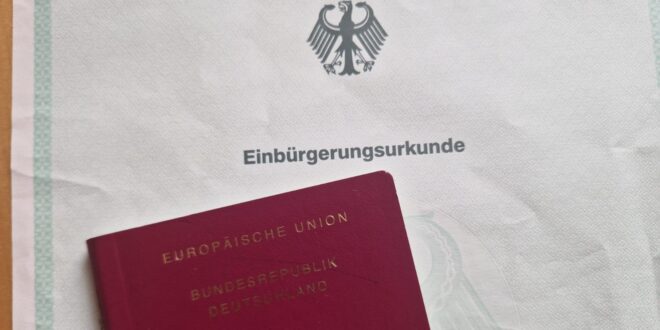In 2023, around 200,100 foreign nationals were naturalised in Germany, the highest number since the time series began in 2000. According to the Federal Statistical Office (Destatis) in a report published on Tuesday, the number of naturalisations rose by around 31,000 (+19%) in 2023 compared to the previous year, having already increased by around 37,000 (+28%) in 2022 compared to the year before that.
People from 157 different nationalities were granted German citizenship in 2023. Former Syrian nationals alone accounted for more than a third (38%) of all naturalisations. Nationals of Syria, Turkey, Iraq, Romania and Afghanistan together accounted for more than half (56%) of all naturalisations.
Naturalised citizens were on average 29.3 years old and therefore significantly younger than the overall population (44.6 years). At 45%, the proportion of women among naturalised citizens was lower than in the overall population (50%).
Syrian nationals were the largest group of naturalised citizens in 2023, with 75,500 people, 27,100 more (+56%) than in the previous year. In 2022, their number had already more than doubled year-on-year to 19,100 and even increased sevenfold to 6,700 in 2021. Before naturalising, they had been in Germany for an average of 6.8 years.
The high number of naturalisations of Syrians is therefore linked to the high influx of Syrian asylum-seekers between 2014 and 2016, who now increasingly fulfil the requirements for naturalisation, including language skills and minimum period of residence. Spouses and underage children can also be naturalised without a minimum period of residence. This affected around 28,000 (37%) of naturalised Syrians in the last reporting year.
In 2023, Turkish and Iraqi nationals together made up the second largest group of origin of naturalised citizens with 10,700 naturalisations each. The number of naturalisations of Iraqi nationals increased by 3,900 (+57%) compared to the previous year, while the number of naturalisations of Turkish nationals fell by 3,500 (-25%). The number of naturalisations of Romanian nationals rose by 600 (+8%) to 7,600 in 2023 and the number of naturalisations of Afghan nationals by 2,300 (+55%) to 6,500.
Naturalisation was generally possible after 8 years of residence in Germany under the citizenship law in force in 2023, the reporting year. This period could be shortened to 7 or 6 years in the case of special integration achievements on the basis of Section 10 (3) sentence 2 of the Citizenship Act. Earlier naturalisation was also possible for family members of naturalised citizens or for spouses of Germans.
The President signed the ‘Act on the Modernisation of Citizenship Law’ and published it on 26 March. It will therefore come into force on 27 June. Applications for naturalisation that are decided after this date will be assessed according to the new law – regardless of when the application was submitted. For most people, the change in the law will bring improvements.
According to the Destatis, there were around 84.7 million people living in Germany at the end of 2023 – 23.9 million of whom had a history of migration (10 million of these were German nationals).
Femi Awoniyi
 THE AFRICAN COURIER. Reporting Africa and its Diaspora! The African Courier is an international magazine published in Germany to report on Africa and the Diaspora African experience. The first issue of the bimonthly magazine appeared on the newsstands on 15 February 1998. The African Courier is a communication forum for European-African political, economic and cultural exchanges, and a voice for Africa in Europe.
THE AFRICAN COURIER. Reporting Africa and its Diaspora! The African Courier is an international magazine published in Germany to report on Africa and the Diaspora African experience. The first issue of the bimonthly magazine appeared on the newsstands on 15 February 1998. The African Courier is a communication forum for European-African political, economic and cultural exchanges, and a voice for Africa in Europe.


































